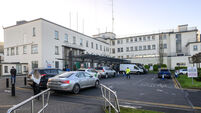HSE warned by board to prepare for increased patient risks due to consultant shortages

Overtime rates frequently make headlines due to the large sums involved.
The HSE has been warned by its own board that it needs to be prepared for increased risk to patients and staff burnout due to the ongoing shortage of hospital consultants.
Minutes from the June 30 HSE board meeting, seen by the , also show the board has been warned of the high cost of paying doctors overtime to make up for the lack of staff.













